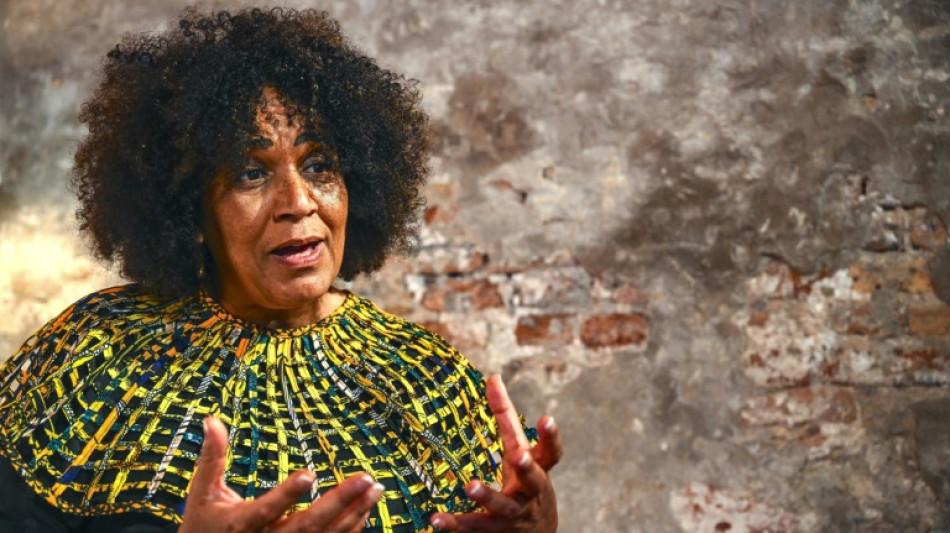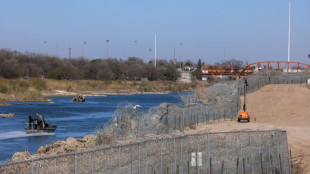
-
 Mbappe can be Real Madrid 'legend' like Ronaldo: Ancelotti
Mbappe can be Real Madrid 'legend' like Ronaldo: Ancelotti
-
Saka 'ready to go' for Arsenal after long injury lay-off: Arteta

-
 Aston Martin to sell stake in Formula One team
Aston Martin to sell stake in Formula One team
-
Three talking points ahead of clay-court season

-
 French court hands Le Pen five-year election ban
French court hands Le Pen five-year election ban
-
Probe accuses ex J-pop star Nakai of sexual assault

-
 Japan leads hefty global stock market losses on tariff woes
Japan leads hefty global stock market losses on tariff woes
-
Saka 'ready to go' after long injury lay-off: Arteta

-
 Ingebrigtsen Sr, on trial for abusing Olympic champion, says he was 'overly protective'
Ingebrigtsen Sr, on trial for abusing Olympic champion, says he was 'overly protective'
-
Tourists and locals enjoy 'ephemeral' Tokyo cherry blossoms

-
 Khamenei warns of 'strong' response if Iran attacked
Khamenei warns of 'strong' response if Iran attacked
-
France fines Apple 150 million euros over privacy feature

-
 UK PM urges nations to smash migrant smuggling gangs 'once and for all'
UK PM urges nations to smash migrant smuggling gangs 'once and for all'
-
Thai authorities probe collapse at quake-hit construction site

-
 France's Le Pen convicted in fake jobs trial
France's Le Pen convicted in fake jobs trial
-
Chinese tech giant Huawei says profits fell 28% last year

-
 Trump says confident of TikTok deal before deadline
Trump says confident of TikTok deal before deadline
-
Myanmar declares week of mourning as hopes fade for quake survivors

-
 Japan's Nikkei leads hefty market losses, gold hits record
Japan's Nikkei leads hefty market losses, gold hits record
-
Tears in Taiwan for relatives hit by Myanmar quake

-
 Venezuela says US revoked transnational oil, gas company licenses
Venezuela says US revoked transnational oil, gas company licenses
-
'Devastated': Relatives await news from Bangkok building collapse

-
 Arsenal, Tottenham to play pre-season North London derby in Hong Kong
Arsenal, Tottenham to play pre-season North London derby in Hong Kong
-
Japan's Nikkei leads hefty equity market losses; gold hits record

-
 Israel's Netanyahu picks new security chief, defying legal challenge
Israel's Netanyahu picks new security chief, defying legal challenge
-
Trump says US tariffs to hit 'all countries'

-
 Prayers and tears for Eid in quake-hit Mandalay
Prayers and tears for Eid in quake-hit Mandalay
-
After flops, movie industry targets fresh start at CinemaCon

-
 Tsunoda targets podium finish in Japan after 'unreal' Red Bull move
Tsunoda targets podium finish in Japan after 'unreal' Red Bull move
-
French chefs await new Michelin guide

-
 UK imposes travel permit on Europeans from Wednesday
UK imposes travel permit on Europeans from Wednesday
-
At his academy, Romanian legend Hagi shapes future champions

-
 Referee's lunch break saved Miami winner Mensik from early exit
Referee's lunch break saved Miami winner Mensik from early exit
-
Djokovic refuses to discuss eye ailment after shock Miami loss

-
 Mitchell magic as Cavs bag 60th win, Pistons and T'Wolves brawl
Mitchell magic as Cavs bag 60th win, Pistons and T'Wolves brawl
-
Mensik shocks Djokovic to win Miami Open

-
 Duterte lawyer: 'compelling' grounds to throw case out
Duterte lawyer: 'compelling' grounds to throw case out
-
What happens on Trump's 'Liberation Day' and beyond?

-
 Clock ticks on Trump's reciprocal tariffs as countries seek reprieve
Clock ticks on Trump's reciprocal tariffs as countries seek reprieve
-
Japan-Australia flagship hydrogen project stumbles

-
 Musk deploys wealth in bid to swing Wisconsin court vote
Musk deploys wealth in bid to swing Wisconsin court vote
-
Mensik upsets Djokovic to win Miami Open

-
 China manufacturing activity grows at highest rate in a year
China manufacturing activity grows at highest rate in a year
-
'Waited for death': Ex-detainees recount horrors of Sudan's RSF prisons

-
 Japan's Nikkei leads big losses in Asian markets as gold hits record
Japan's Nikkei leads big losses in Asian markets as gold hits record
-
Rescue hopes fading three days after deadly Myanmar quake

-
 'Basketbrawl' as seven ejected in Pistons-Wolves clash
'Basketbrawl' as seven ejected in Pistons-Wolves clash
-
Four men loom large in Microsoft history

-
 Computer pioneer Microsoft turns 50 in the age of AI
Computer pioneer Microsoft turns 50 in the age of AI
-
Trump calls out both Putin and Zelensky over ceasefire talks


Venice exhibition shines light on Africa's forced urbanisation
From nomads to deforestation, this year's Venice Architecture Biennale focuses on Africa and the impact of colonisation on the development of a continent undergoing the most rapid urbanisation in the world.
Away from the national pavilions, the main exhibition put together by Biennale curator Lesley Lokko shines a light on the enduring impact of the colonising Europeans who upended traditional ways of life.
Mounir Ayoub, a 40-year-old Tunisian architect based in Geneva, has long been interested in the phenomenon in Tunisia of forced settlement.
Before being colonised by France in 1881, the North African country of his birth "was mostly a country with a nomadic population -- 600,000 nomads and 400,000 sedentary (settled) people", he told AFP.
But through his collection of photos, documents and video testimony from the few remaining nomad families, he argues that France initiated a policy that eventually left the Tunisian desert depopulated.
"The desert was not empty, it was a rich ecosystem with a huge culture. The desert was populated, it was a place of immense civilisation," he told AFP at the exhibition at Venice's former shipyards.
But "France created new cities with oases where water was extracted deep in the desert in order to settle the nomads, to control them, in fact, to start setting up borders", said Ayoub.
The policy continued even after Tunisian independence in 1956, he said, with Tunisian nomads definitively settled by the 1970s and 1980s.
Pointing to places on a map that he said once teemed with life, he lamented that "now there is almost nothing left... even though the whole of Arab civilisation comes from the desert and nomadism".
The end of nomadism was a cultural loss but also an environmental one, as the travelling families had "a minimal impact on the environment", said Ayoub.
The exhibit includes a nomadic tent -- "organic architecture in the first sense of the word: goats, sheep and camels provide hair that is woven into tents".
- No return to 'pure state' -
The number of cities in Africa has doubled since 1990, with their combined population increasing by 500 million people, according to the African Development Bank.
But urban and economic growth has been not only at the expense of Africa's vast deserts but also the continent's forests.
Sammy Baloji, a photographic artist from Lubumbashi, a city in the south of the Democratic Republic of Congo, charted the depletion of his country's rainforests in his project for the exhibition.
He says the process began with Belgium's rule over his country, as part of a colony also including Rwanda and Burundi, when traditional methods of cultivation were abandoned in favour of intensive agriculture.
Baloji said his project, "Debris of History, Issues of Memory", examines "all this human activity from which global warming stems, through the colonisation and devastation of this original vegetation".
The basin of the Congo River is a huge rainforest, second in size only to the Amazon, that absorbs more carbon than it releases -- an environmental benefit threatened by deforestation.
"The question is not to return Africa to its pure state," said Baloji.
"What is interesting is to observe what has been done so far: has it been done taking into account the local populations, their knowledge? Or has it been a devastation of that system to impose another system?"
- Past trauma, future visions -
The exhibition is the brainchild of Lokko, a Ghanaian-Scottish architect who curated this year's Biennale.
She invited 89 participants to contribute to "The Laboratory of the Future", with more than half of them from Africa or the African diaspora.
"We're looking at the more painful aspects of the past, and using that trauma and that vulnerability around questions of identity, migration... which are generally questions architects don't deal with, to inform new visons of the future," Lokko told AFP.
"Our relationship to the environment is a cultural relationship, it's not only a scientific or transactional relationship."
The job of every architect, she said, is "to look at the past in order to project an idea about the future".
L.Harper--AMWN



